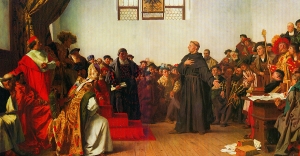VIII. Although our justification will be fully declared on the last day (our good works also being brought forward as the sign and proof its truth, Mt. 25:34–40), still falsely would anyone maintain from this a twofold gospel justification—one from faith in . . . Continue reading →
2017 Archive
WSC Student Housing Construction Update 24 October 2017

This gallery contains 4 photos.
Why We Remember The Reformation (Part 3)
“God’s verdict of not guilty and his imputing of his own righteousness to us at the beginning of the Christian life is by faith alone… that’s how we get started. James is answering the question ‘does the ongoing and final reckoning of . . . Continue reading →
Resources On The Controversy Over “Final Salvation Through Works”
For the last several years several writers identified with the broader Reformed movement have proposed that Christians are saved initially by grace alone, through faith alone but finally through faith and works. There are two claims here: 1) salvation is in two . . . Continue reading →
With Chris Gordon On What It Means To Be Born Again (Part 1)
“I was saved in…” or “I was born again…” are both sentiments regularly expressed by well-meaning evangelicals. They mean to testify to the power of the Lord to save and to the reality of salvation in our time. We should affirm that . . . Continue reading →
Did Ursinus Teach Final Salvation Through Faith And Works?
Zacharias Ursinus (1534–83) was the principal author of the Heidelberg Catechism (1563). He was responsible for perhaps as much as 70% of the catechism, though the two source documents that he created, from which much of the catechism was formed, drew from . . . Continue reading →
Background On The Current Salvation Controversy
In 1980, Daniel P. Fuller published Gospel and Law: Contrast or Continuum seeking to lay siege to both the Dispensational tradition in which he had been raised and covenant theology as he understood it. This work provoked strong responses from some within . . . Continue reading →
Why We Remember The Reformation (Part 2)
Salvation Sola Gratia, Sola Fide: On Distinguishing Is, With, And Through
It is ironic that, as we celebrate the 500th anniversary of the Reformation, the Reformed-ish wing of evangelicalism is having a controversy over salvation. It has been proposed by a leading evangelical pastor that we are initially justified by grace alone, through . . . Continue reading →
Calvin On Salvation By Grace Alone Through Faith Alone.
8. For by grace are ye saved. This is an inference from the former statements. Having treated of election and of effectual calling, he arrives at this general conclusion, that they had obtained salvation by faith alone. First, he asserts, that the . . . Continue reading →
Office Hours: What Happened To The Reformation? (Part 2)
It is October 2017. 500 years ago this month Martin Luther wrote 95 theses against the abuse of indulgences in the Western church. We have traced the Reformation to this date for a long time but as you and I have discussed . . . Continue reading →
Ephesians 2:9: Good Works Are From Salvation Not Unto Salvation
2:9 οὐκ ἐξ ἔργων (ouk ex ergōn), “not from works.” There are two important elements to v. 9. The first is the another abrupt statement: “not from works” (also Rom 9:12 and Titus 3:5; cf. Rom 11:6). This shows the fundamental Pauline . . . Continue reading →
Why We Remember The Reformation
Ephesians 2:8 Presents Salvation As Completed Not Initiated
2:8 Τῇ γὰρ χάριτί ἐστε σεσῳσμένοι διὰ πίστεως (Tē gar chariti este sesōsmenoi dia pisteōs), “for by grace you are saved through faith.” Paul resumes the line previewed in v. 5 with the addition of explanatory γάρ (gar), “[F]or by grace you . . . Continue reading →
In By Grace, Stay In By Faithfulness?
We are approaching on Reformation Day again this seems like a good time to cover the basics again. The medieval church came to teach that we enter a state of grace through baptism. According to the medieval church, we remain a state . . . Continue reading →
Zwingli Contra The Pentecostalism Of The Catabaptists
Though the Catabaptists, who pretend to be so directed by the Spirit that if they stand still suddenly or go forward suddenly, they put it down to the Spirit, are not wrong (for we do not live, much less move, without the . . . Continue reading →
With Pilgrim Radio On “Left Behind” And Predictions Of Christ’s Return
Recently I sat for an interview with Bill Feltner of Pilgrim Radio about Matthew 24, David Meade, the “Left Behind” (secret rapture) theology, and predictions of Christ’s return. We discussed what our Lord actually said on the Mt of Olives and what . . . Continue reading →
William Perkins: Who Are The True Catholics?
There are truly important works that have simply been forgotten or unjustly ignored. One of those is William Ames’ Fresh Suit Against Human Ceremonies in defense of the Reformed theology and practice of worship. Another is William Perkins’ 1597 treatise, A Reformed . . . Continue reading →
The Freedom Of The Christian Man
There is a great lot of talk in the evangelical and Reformed world(s) about sola Scriptura but one has the growing sense that not only is the Reformation scripture principle not well understood (e.g., it is often misconstrued as an endorsement of . . . Continue reading →
What Does “General Equity” Mean?
I. As the ceremonial law was concerned with God, the political was concerned with the neighbor. II. In those matters on which it is in harmony with the moral law and with ordinary justice, it is binding upon us. III. In those . . . Continue reading →










